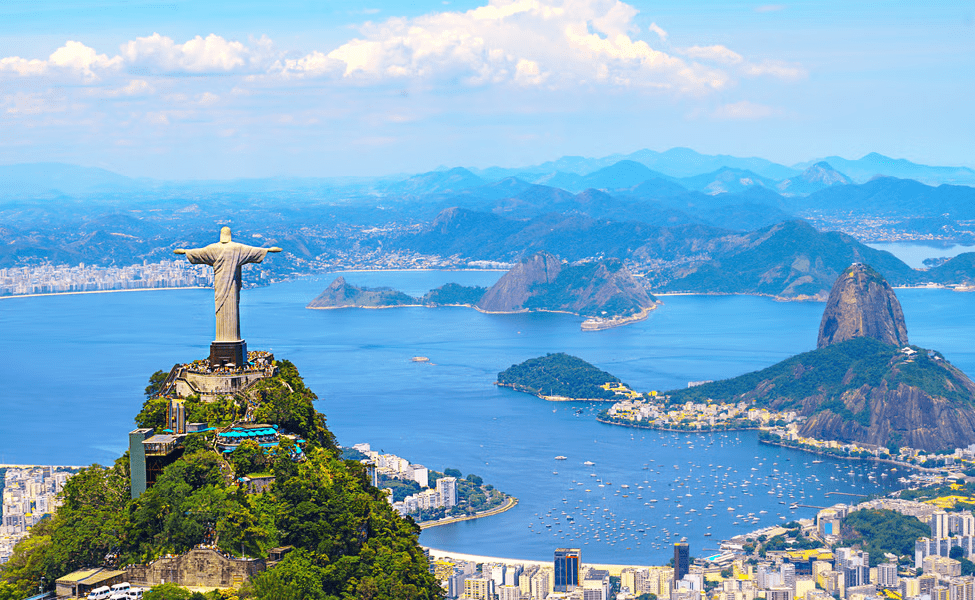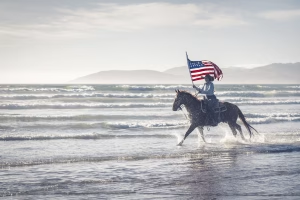Brazil pulses with an infectious rhythm, and its people are filled with an irrepressible zest for life. And nowhere is this joyous spirit more evident than in the many festivals in Brazil that punctuate the calendar.
From the world-famous samba parades of Carnival to the rustic charm of the traditional celebrations and events in Brazil, these celebrations offer a kaleidoscopic window into the soul of this vibrant nation.
- Major Festivals in Brazil
- 1. Carnival of Rio de Janeiro
- 2. São João Festival
- 3. Folklore Festival of Parintins
- Unique Local Celebrations
- 1. Cavalhadas Festival
- 2. Festa de Iemanjá
- Religious Festivals in Brazil
- 1. Festa do Divino
- 2. Nossa Senhora Aparecida
- Tips for Attending Brazilian Festivals
- Why Choose OneVasco?
- FAQs
Major Festivals in Brazil
1. Carnival of Rio de Janeiro

The Carnival of Rio de Janeiro is Brazil’s most iconic festival, drawing millions of revelers from around the globe. Rooted in 18th-century Portuguese traditions, it evolved with African influences into the dazzling event it is today.
-
Dates: Held annually before Lent, typically in late February or early March.
-
Key Highlights:
-
The Samba Parade at the Sambadrome features elaborate floats and costumes.
-
Street parties (blocos) with live music and dancing across the city.
-
A festive atmosphere with millions participating in celebrations day and night.
-
-
Traditions:
-
Samba schools compete in grand parades, showcasing months of preparation.
-
Revelers wear colorful costumes, masks, and accessories.
-
African rhythms and traditional samba define the music and dance styles.
-
2. São João Festival

The São João Festival is a vibrant celebration of rural life and Catholic traditions held in June. It has roots in pagan and Christian customs. This second-largest Brazilian festival honors saints like Santo Antônio, São João, and São Pedro.
-
Dates:
-
Celebrated primarily on June 23rd and 24th, with events often lasting the entire month.
-
-
Key Highlights:
-
Bonfires: Central to the festival, symbolizing warmth and community.
-
Fireworks: Light the night sky, especially on São João’s Eve.
-
Quadrilha Dances: Folk dances performed in pairs, mimicking rural wedding ceremonies.
-
-
Cultural Traditions:
-
Attendees dress in caipira attire, with plaid shirts, straw hats, and dresses reflecting rural aesthetics.
-
Rituals like jumping over bonfires are believed to bring good fortune.
-
Street parades filled with music, dancing, and traditional games.
-
3. Folklore Festival of Parintins

Held in the Amazonian city of Parintins, this festival celebrates the region’s rich folklore and traditions. The event, rooted in a century-old rivalry between two groups, is a colorful and energetic display of culture and community.
-
Dates:
-
Takes place annually in late June over three days.
-
-
Key Highlights:
-
Bumbódromo Performances: Rival teams Caprichoso (blue) and Garantido (red) compete with grand floats, vibrant costumes, and choreographed dances.
-
Live Music: Includes traditional Amazonian rhythms and performances by local musicians.
-
-
Cultural Traditions:
-
The rivalry between Caprichoso and Garantido is friendly yet intense, fostering community spirit.
-
Spectators actively participate by wearing the colors of their preferred team.
-
Ritual storytelling through song and dance reflects the rich heritage of the Amazon.
-
Unique Local Celebrations
1. Cavalhadas Festival

This vibrant festival, rooted in medieval European traditions, reenacts the historical battles between Moors and Christians. Introduced by Portuguese settlers, the Cavalhadas have been adapted with local Brazilian influences and have become a cherished celebration of culture and history.
-
Dates:
-
Typically held in June during the feast of the Holy Spirit, though dates may vary by city.
-
-
Key Highlights:
-
Theatrical Mock Battles: Riders in elaborate costumes representing Moors (in vibrant colors) and Christians (in white) engage in choreographed horseback battles.
-
Parades: Festive processions showcase participants in intricate outfits, adding to the visual spectacle.
-
Cultural Performances: Traditional music and dance accompany the events, reflecting local customs.
-
-
Cultural Traditions:
-
The reenactment symbolizes the victory of Christianity over Islam, with a celebratory ending marked by unity.
-
Participants spend months preparing elaborate costumes and perfecting their roles.
-
2. Festa de Iemanjá
This festival, celebrated on February 2nd, honors Iemanjá, the Afro-Brazilian Goddess of the Sea. It is deeply significant for followers of Candomblé and Umbanda. Festa de Iemanjá is a beautiful fusion of spirituality and culture, uniting communities in reverence and celebration by the sea.
-
Key Practices:
-
Devotees offer flowers, perfumes, and mirrors, placing them in small boats released into the sea as gifts for Iemanjá.
-
-
Regional Highlights:
-
Salvador, Bahia: Celebrations at Rio Vermelho beach feature thousands of participants, with a procession of boats carrying offerings to the sea.
-
Rio de Janeiro: The festival at Copacabana Beach includes live music, dancing, and vibrant gatherings.
-
Religious Festivals in Brazil
1. Festa do Divino

One of Brazil’s oldest religious festivals, Festa do Divino traces its origins to medieval Portugal and celebrates the descent of the Holy Spirit upon the apostles during Pentecost.
-
Dates: Celebrated around Pentecost Sunday, varying yearly based on the Christian calendar.
-
Key Rituals:
-
Crowning of the Emperor of the Divine: A chosen figure symbolizing the Holy Spirit.
-
Charitable Acts: Distribution of bread and soup to the community.
-
-
Celebrations:
-
Masses and Processions: Religious services and symbolic marches.
-
Parades and Music: Floats, costumes, and live music add a festive touch.
-
Community Gathering: Dancing and feasting bring everyone together.
-
2. Nossa Senhora Aparecida
The festival honoring Our Lady of Aparecida, Brazil’s patron saint, is a deeply significant religious event for Brazilian Catholics, celebrated with reverence and grandeur on October 12th, a national holiday.
-
Importance:
-
Symbol of Faith: Our Lady of Aparecida represents hope and unity for millions of Brazilian Catholics.
-
National Holiday: A day of prayer, celebration, and reflection across the country.
-
-
Main Events:
-
Grand Mass: Held at the Basilica of the National Shrine of Our Lady of Aparecida in São Paulo, one of the largest Marian shrines in the world.
-
Pilgrimages: Millions of devotees journey to the basilica, some traveling long distances on foot.
-
This festival exemplifies Brazil’s profound Catholic heritage and the enduring devotion to Our Lady of Aparecida.
-
Tips for Attending Brazilian Festivals
-
Consider staying slightly outside the main festival area (e.g., Lapa instead of Ipanema) for more affordable options during Carnival in Rio.
-
Bring a waterproof phone pouch, particularly for beach festivals like Festa de Iemanjá, where you may be near water or on boats.
-
For large events like the Parintins Folklore Festival, arrange transfers from the airport to your accommodation in advance as taxis may be limited.
-
In hot, humid festivals like São João or Rio Carnival, carry a refillable water bottle and sunscreen.
-
Learn a few key phrases in Portuguese, such as “por favor” (please) and “obrigado/a” (thank you).
-
Ask locals about specific festival customs; for example, wearing white at Festa de Iemanjá is traditional and appreciated.
What to Expect at Brazilian Festivals
-
Lively atmosphere: Brazilian festivals are known for their vibrant energy, with music, dancing, and colorful decorations.
-
Delicious food and drink: Many festivals feature traditional foods and beverages, such as acarajé (a fried bean cake) at Festa de Iemanjá or canjica (a sweet corn porridge) at São João.
-
Friendly locals: Brazilians are known for their warm hospitality, and festivals are a great opportunity to interact with locals and make new friends.
-
Late nights: Many festivals, particularly Carnival, continue well into the early morning hours. Be prepared for some late nights!
Why Choose OneVasco?
OneVasco makes visa applications effortless. Our expert team manages the entire process, allowing you to focus on your journey.
Enjoy stress-free travel with fast visa approvals.
-
Expert and Personalized Support
-
Efficient and Hassle-Free Process
-
Real-Time Tracking and Updates
-
Transparent Communication
-
Trusted by Millions
FAQs
1. What is the most popular festival in Brazil?
The most popular festival in Brazil is undoubtedly Carnival, particularly the celebrations in Rio de Janeiro. Attracting millions of visitors each year, Rio’s Carnival is considered the largest carnival celebration in the world.
2. When does the Carnival take place?
Carnival takes place in the days leading up to Ash Wednesday, which marks the beginning of Lent in the Christian calendar. The exact dates vary from year to year, but Carnival typically falls in February or March.
3. What other festivals should I consider attending in Brazil?
In addition to Carnival, some other notable festivals to consider are:
-
São João Festival in June
-
Festa de Iemanjá on February 2nd
-
Festa do Divino in May or June
-
Folklore Festival of Parintins in late June
Each of these festivals offers a unique glimpse into Brazilian culture and traditions.
4. What cultural influences shape Brazilian festivals?
A rich blend of European, African, and indigenous influences shapes Brazilian festivals. European settlers brought many festival traditions, particularly related to the Christian calendar. African influences are strongly evident in the music and dance of many festivals, such as the samba of Carnival.
5. Are there any food festivals in Brazil?
Brazil does have several notable food festivals. These include:
-
Festival Brasil Sabor (nationwide, May)
-
Comida di Buteco (Belo Horizonte, April-May)
-
Festival do Camarão (Ilhabela, July)
-
Festa Nacional do Doce (Pelotas, November)





















